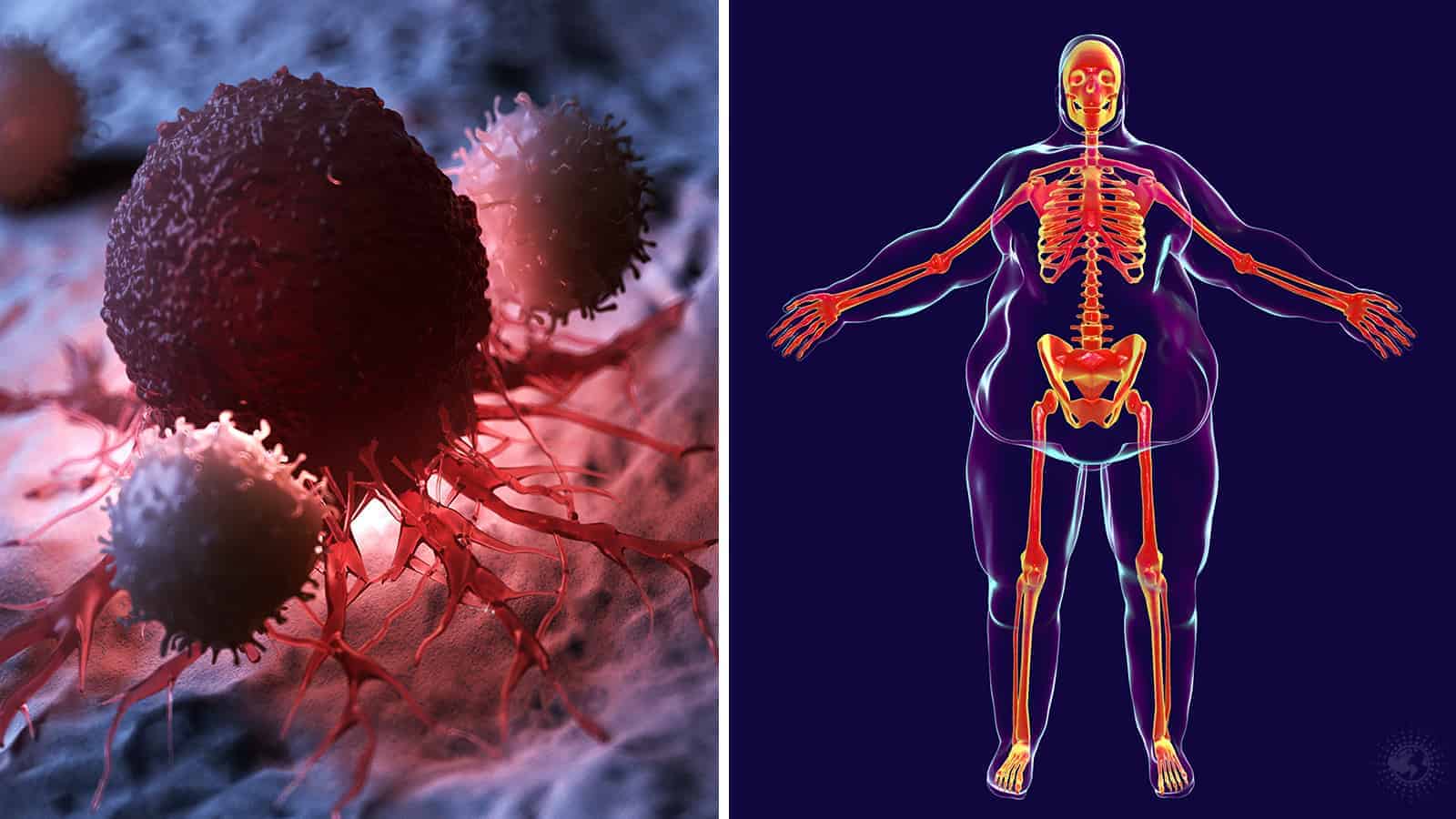In a recent study, scientists found that a high-fat diet may impair the immune system and accelerate tumor growth. In previous research, obesity increased the risk of over 12 different cancers; it also led to a worse diagnosis and survival rate. This research also helped scientists learn how obesity increases tumor growth; underlying causes include metabolic changes and chronic inflammation. In the Harvard study published on December 9, 2020, researchers found that obesity actually gives cancer cells the upper hand over immune cells when fighting for fuel.
Researchers at the Harvard Medical School used mice to analyze how cancer cells would react to a high-fat diet. The study published in the journal Cell reveals new information about obesity and cancer. This new information could change the future of immunotherapy.
The team found that a high-fat diet reduced the amount and antitumor activity of CD8+T cells, an important immune cell, within tumors. Scientists discovered that this happens because cancer cells alter their metabolism in response to higher fat accessibility. Thus, they have a better capability of eating up fat molecules, which starves the T cells of fuel, increasing tumor growth.
“Putting the same tumor in obese and nonobese settings reveals that cancer cells rewire their metabolism in response to a high-fat diet,” said Marcia Haigis, professor of cell biology in the Blavatnik Institute at HMS and co-senior author of the study. “This finding suggests that a therapy that would potentially work in one setting might not be as effective in another, which needs to be better understood given the obesity epidemic in our society.”
Implications for this research on the future of immunotherapy
The research revealed that blocking the metabolic reprogramming process decreased tumor growth in mice given high-fat diets. In current immunotherapies, oncology nurses use CD8+T cells as the primary strategy to boost the immune response against cancer. The new study may lead to better immunotherapy techniques in the future.“Cancer immunotherapies are making an enormous impact on patients’ lives, but they do not benefit everyone,” said co-senior author Arlene Sharpe, the HMS George Fabyan Professor of Comparative Pathology and chair the Department of Immunology in the Blavatnik Institute.
“We now know there is a metabolic tug-of-war between T cells and tumor cells that changes with obesity,” Sharpe said. “Our study provides a roadmap to explore this interplay, which can help us to start thinking about cancer immunotherapies and combination therapies in new ways.”
For the study, the team analyzed how obesity affected various types of cancer in mice such as breast, melanoma, and colorectal. Researchers fed the mice either normal or high-fat diets; mice eating higher fat gained weight and experienced other signs of obesity. Then, they studied the various cell types and molecules within and around the tumors, known as the tumor microenvironment.
How cancer cells reacted to higher levels of fat
Unsurprisingly, the team discovered that tumor growth occurred more quickly in mice on high-fat diets. However, they found this only happened for immunogenic cancers, which have large amounts of immune cells. The immune system also recognizes them more easily, making them more likely to respond.
The study revealed that obesity-related tumor growth depended solely on CD8+ T cell activity; these immune cells target and kill cancer cells. Diet did not impact tumor growth rate if researchers removed CD8+ T cells from the mice. Interestingly, they found that high-fat diets caused the immune cells to decrease in the tumor microenvironment. However, the immune cells didn’t change anywhere else in the body.
What the team discovered
The cells left in the tumor showed less strength, dividing more slowly and becoming lethargic. However, when the researchers grew these cells in a lab, they showed normal activity levels. To the team, this implied that something in the tumor caused cells to malfunction.
Furthermore, the team found that in obese mice, the microenvironment had no major free fatty acids, a key fuel for cells. The rest of the body still contained fatty acids, as you would expect in obesity.
This led researchers to keep a log of the metabolic profiles of the various tumor cells for both high- and normal fat diets. Their analysis found that cancer cells adapted their metabolism when faced with higher fat accessibility. When introduced to a high-fat diet, cancer cells altered their metabolism to increase fat absorption. The immune cells didn’t reprogram themselves, leading to the cells being depleted of essential fatty acids.
“The paradoxical depletion of fatty acids was one of the most surprising findings of this study. It really blew us away, and it was the launchpad for our analyses,” said Ringel, a postdoctoral fellow in the Haigis lab. “That obesity and whole-body metabolism can change how different cells in tumors utilize fuel was an exciting discovery, and our metabolic atlas now allows us to dissect and better understand these processes.”
Final thoughts on the changes in metabolic pathways of cancer and immune cells
The team used single-cell gene expression analyses, comprehensive protein surveys, and high-resolution imaging to study how various diets altered metabolism. When analyzing these cells in the microenvironment, they honed in on a protein called PHD3. This protein slows down the absorption of fat in normal cells. However, the cancer cells in obese mice had lower PHD3 levels compared to the healthy mice.
When the team increased PHD in the cells, they discovered the tumor’s fat intake decreased dramatically. This also helped free fatty acids recover in the tumor microenvironment. So, boosting PHD3 expression reversed most of the negative outcomes of a high-fat diet on immune cell function. Tumor growth rate with high levels of this protein decreased in obese mice compared to those with low PHD3. The increased immune cell activity caused this to occur; in the obese mice without immune cells, protein levels did not affect tumor growth.
While PHD3’s potential in treating cancer will require more research, this discovery may lead to scientists focusing more on cell metabolism in the future.
“We’re interested in identifying pathways that we could use as potential targets to prevent cancer growth and to increase immune antitumor function,” Haigis said. “Our study provides a high-resolution metabolic atlas to mine for insights into obesity, tumor immunity, and the crosstalk and competition between immune and tumor cells. There are likely many other cell types involved and many more pathways to be explored.”
















 Community
Community

